For many fleet operators, the core challenge has moved beyond simple scheduling. The real task now is coordinating a dynamic, interconnected system of assets, drivers, and passenger needs. This complexity often gets managed with legacy tools, such as static spreadsheets, constant phone calls, and dispatchers navigating by instinct. These methods create significant operational blind spots. They make it difficult to see the true potential within your own fleet. What if the solution is not just a better way to book trips, but a fundamental change in how you perceive your operation? We are moving from a model of simple transportation to one of integrated mobility services.
The key to this evolution is an intelligent platform. It records reservations and actively manages your entire network. It turns data into decisive action and fragmented tasks into a seamless workflow. It is how modern fleets unlock new levels of efficiency and reliability.
Learn more about implementing a smart bus booking system for fleet operators to simplify and digitize your daily operations.
The Bus Booking System as Your Fleet’s Digital Brain
Let us be clear, we are not talking about a slightly better digital calendar. A true bus booking system acts as the central nervous system for your entire operation. It is the thing that connects everything. Think about it, processing constant streams of information coming from bookings, GPS pings from a dozen vehicles, and traffic data updates. Even the driver notes a maintenance issue, while a basic system logs it, and all other data.
An intelligent bus booking software then acts on it, making decisions in the background. It automatically assigns the nearest, most suitable vehicle based on real-time location and passenger capacity, not just which one looks free on a grid. It recalculates a route to avoid a sudden traffic jam, saving fuel and time without the dispatcher needing to lift a finger. This is the "phygital" bridge in action, a term we rather like.
It merges the digital world of online bus booking systems and app-based tracking with the physical reality of rubber on asphalt and diesel in tanks. It finally makes your operation feel coherent.
To explore how connected systems improve coordination, check out our end-to-end transportation management solution designed for modern mobility needs.
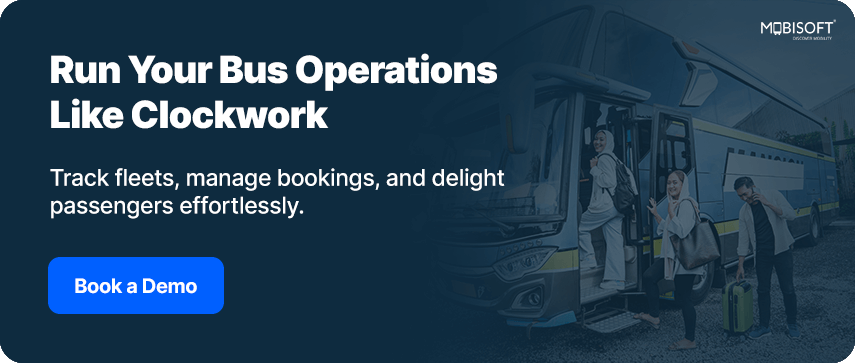
The Four Levels of Fleet Digitization
So, where does your company fit in this new framework? We find it helpful to think in stages of maturity. It gives you a way to measure your progress beyond just profit and loss.
Stage one
- Most fleets begin at stage one, which is reactive. It refers to the conventional methods of working, such as spreadsheets and non-stop ringing phones.
- Every day is a scramble to plug the latest leak, and it is exhausting.
Stage Two
- Stage two is proactive, or basic digitization. You may have a simple bus ticket booking system that helps passengers reserve trips through an online bus booking software.
- This is a good step, a necessary one in fact. The brainpower, however, is still mostly human in this stage.
- Dispatchers are still making all the key decisions manually, cross-referencing between screens. The system is a tool, not a partner.
Stage Three
- The third stage is optimization. This is where the workflow layer truly kicks in. Scheduling, dispatch, and passenger communication become automated, integrated workflows.
- The platform offers recommendations, executes routines, and surfaces critical insights.
- Your team stops pushing paper and starts managing exceptions. This is the sweet spot for modern, efficient operations supported by a smart bus scheduling and booking system.
The final stage, stage four, is predictive. Here, the system begins to anticipate. Machine learning helps predict demand by looking at past data, local happenings, and weather. It might tell you to put a car in a certain area before rush hour starts. It deals with what's going on now and gets ready for what's coming. Think about this: how far are you from reaching that perfect setup? Often, you're closer than you think.
See how you can optimize fleet operations with a TMS to reach higher levels of automation and control.
Unlocking Latent Capacity: Discover Profit Hidden in Your Existing Fleet
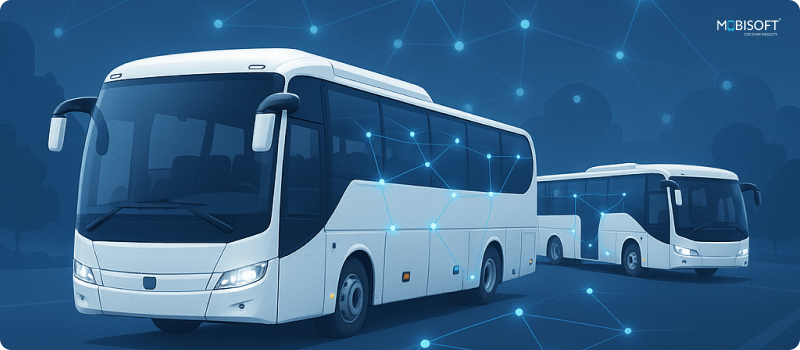
Latent capacity is an intriguing idea for our clients because every single fleet implements it. Latent capacity is the unused potential hiding in your existing assets. Those empty seats on a return journey, the two-hour gap between a school run and a corporate charter, the slightly inefficient route that adds five minutes to every trip. It is profit, just waiting to be unlocked. The key to this is an efficient bus booking system or an advanced bus reservation system for fleet operators.
Micro-scheduling
Micro-scheduling fills the dead time. For instance, our bus operator booking software could identify a 45-minute window between two major bookings and automatically offer that slot for a premium, last-minute airport transfer.
Dynamic Pricing
With a deep understanding of demand patterns, you could adopt flexible pricing for high-value routes or peak booking times, much like airlines or hotels do. Why charge a flat rate when demand is through the roof?
Digital Twins
It is a virtual, dynamic model of your entire fleet. Before committing a real vehicle to a new contract or a changed route, you can simulate the impact on the digital twin. Will it cause a driver to exceed their hours? Will it increase fuel costs beyond the revenue it generates? It is a powerful way to plan, allowing you to test these scenarios with zero risk.
Discover how automation enhances bus booking efficiency and helps uncover hidden capacity within your fleet.
The Broader Benefits of an Intelligent Bus Booking Ecosystem
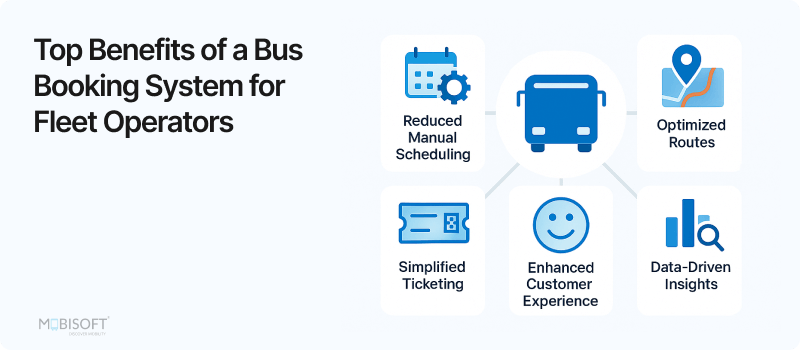
The benefit of this approach is an added layer of advantages. Apart from operational efficiency and cost savings, the secondary effects are just as compelling.
Talent management
The best dispatchers and drivers want to work with smart tools. They do not want to be data entry clerks. Giving them a sophisticated bus booking software is a statement. It shows you value their time and skill, making it easier to attract and keep good people. Your tech stack becomes a recruitment tool.
ESG Impact
This is not just a compliance checkbox anymore. Smart online bus booking systems help vehicles with lower fuel consumption. Through optimized routes and reduced idle time, it also helps emit less carbon. The platform can automatically generate the reports to prove it. That is a powerful story to tell when bidding for contracts with corporations or municipalities that have strong sustainability goals.
Business Resilience
When your operational knowledge lives in a veteran dispatcher’s head, you are vulnerable. What happens when they retire or leave? An orchestration platform captures that institutional knowledge. The bus fleet management software becomes your corporate memory, making your entire business more resilient and less dependent on any single person.
You can also explore the Benefits of modern bus management systems to see how digital solutions drive workforce efficiency and business resilience.
The Digital Edge: Delivering Effortless Journeys Through Data
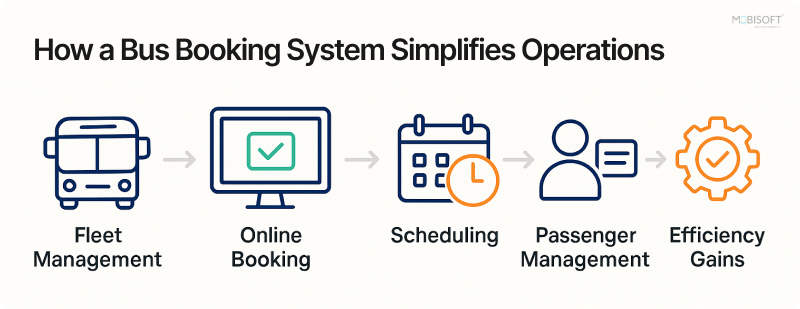
We have talked a lot about the back office. But what does the passenger experience in an orchestrated fleet? We believe the best service is invisible. It is not about a flashy app with too many features. It is about the complete removal of friction.
Proactive Communication
The bus ticket booking and reservation system does not wait for a problem. It confirms the booking instantly. It sends a reminder the day before. It provides a live ETA and notifies the passenger the moment the vehicle is two minutes away. The passenger feels informed and cared for without having to ask for anything.
Passenger Identity
Picture an online bus booking system for operators that knows a specific customer always needs a wheelchair-friendly ride or that a business booker likes their receipt sent straight to their money folks. These little personal touches make every ride feel smooth and easy. They build loyalty.
Real-Time Tracking
This is so much more than a blue dot on a map. It is a fundamental builder of trust. Knowing exactly where their ride is eliminates passenger anxiety. It stops those "where's my bus?" calls that clog up your dispatch lines. It turns a moment of uncertainty into a moment of confidence.
Why Data is the New Fuel for Modern Fleet Operations?
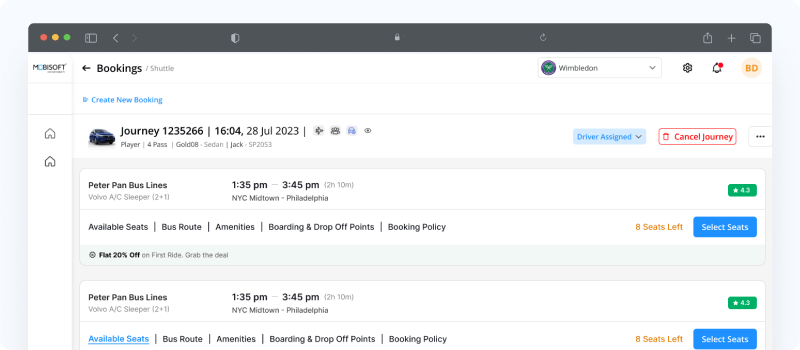
It is a simple but profound change in perspective. The most valuable asset you own might not be your buses. It is the data they produce every day. The routes, the times, the fuel consumption, the passenger patterns. This information is a goldmine.
Smart bus booking systems allow you to move from being a company that operates buses to a nimble, data-driven mobility service. The standard is rising every day. Operators who will thrive are the ones who see their role as conductors of a network, not just managers of vehicles.
The question is no longer if you need a better bus booking software. It is whether you are ready to embrace the platform that lets you truly orchestrate your future. Maybe it is time to see what you have been missing.
If you’re interested, explore more about digital booking platforms for bus operators to understand how passenger experiences are being redefined.
Key Takeaways
- Modern bus booking systems bring order to daily chaos, connecting routes, vehicles, and passenger data into one intelligent workflow. They make coordination easier, faster, and far more reliable.
- Automation quietly takes over the heavy lifting, from dispatching to passenger updates, allowing teams to focus on decisions that actually need human judgment.
- Data becomes your silent partner, uncovering underused capacity, missed time slots, and untapped profit areas within the fleet you already have.
- Smarter routing means fewer empty miles and less fuel burned, directly improving your ESG standing while cutting costs.
- Institutional knowledge gets preserved in the system itself, making your business steadier and less reliant on a few key people.
- Altogether, these technologies build efficiency, resilience, and confidence into everyday operations, without adding complexity.

FAQs
How can digital tools help uncover hidden capacity?
Data analytics can show idle hours, empty return trips, or underused routes in your current operations. The right bus scheduling and booking system turns those gaps into revenue opportunities without needing more vehicles or staff. This upgrade in efficiency is hiding in plain sight.
Why is data becoming a fleet’s most valuable asset?
Each trip, delay, and fuel refill creates information to guide smarter choices. When organized and interpreted well, this data helps predict demand, control costs, and boost reliability. In many ways, it acts as the brain driving the whole business.
How do such systems support ESG goals?
They lower fuel waste by optimizing routes and reducing idle time, directly cutting emissions. Automated reporting also helps meet compliance needs with measurable evidence. Beyond savings, it builds credibility with partners who prioritize sustainability.
What does institutional knowledge mean in fleet operations?
It's the experience stored in people's minds—how to manage routes, who handles which clients, and what patterns keep coming up. When a smart online bus booking system captures this knowledge, it becomes shared and lasting. It keeps your business stable even when teams change.
How does predictive technology benefit long-term planning?
By looking at old info and current trends, these smart bus booking systems can see when things will get busy, when repairs might be needed, and how to best use what you have. This helps you plan instead of just reacting. Being able to see what's coming keeps both your schedule and your wallet in check.
What should a company look for when adopting a bus booking platform?
Look for flexibility, scalability, and ease of integration with your existing tools. The best bus booking software grows with your business, supporting new routes, partnerships, and service types without requiring constant rebuilds. It’s an investment that strengthens over time.

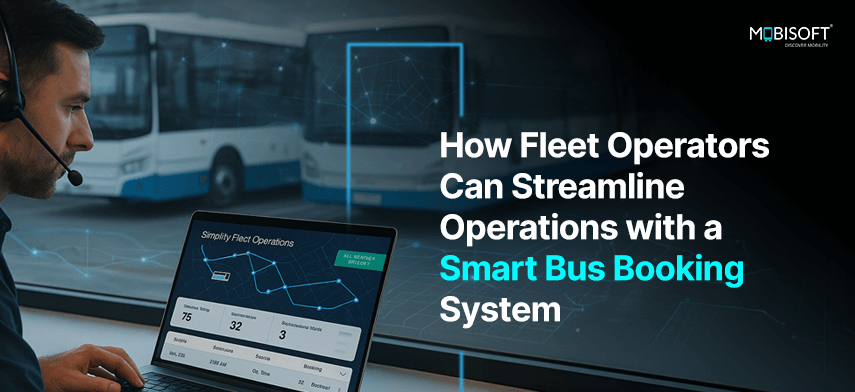


 October 14, 2025
October 14, 2025


